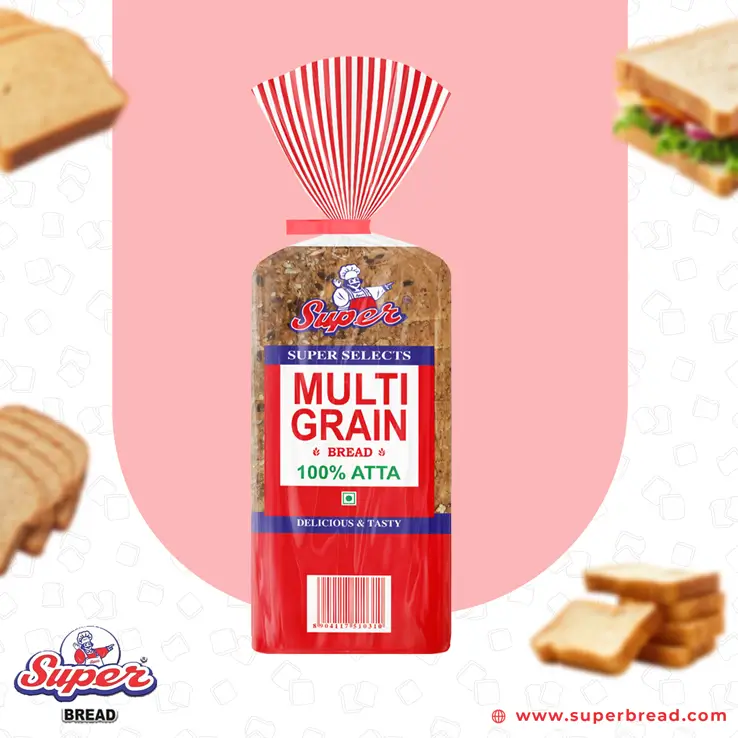Why Multigrain Bread Is the Healthiest Choice for Your Breakfast
- Blogs
- Why Multigrain Bread Is the Healthiest Choice for Your Breakfast

Breakfast is greatly emphasized as being the most important meal of the day and rightly so. It can establish your metabolic rate; it feeds your body and your brain, while also setting an energy level for the rest of the day. With our fast-paced lives, finding a breakfast option that's both nutritious and convenient can be a challenge. That's where multigrain bread comes into the spotlight. At Super Bread, we take pride in delivering bread that not only tastes great but also supports your healthy lifestyle. Let's explore why multigrain bread is the healthiest choice for your breakfast and how it can become a wholesome staple in your daily diet.
What is Multigrain Bread?
Multigrain bread is made using two or more types of grain. These grains can include wheat, oats, barley, millet, corn, flax, and more. Unlike white bread, which is made with refined wheat flour, multigrain bread incorporates a variety of whole and refined grains. The result? A dense, hearty loaf filled with fiber, essential nutrients, and complex carbohydrates.
Each grain in multigrain bread contributes its own set of nutrients. For example:
- Beta-glucan is a sugar found in oats that assists in reducing cholesterol, as this soluble fiber.
- Barley contains selenium and antioxidants.
- A good source of omega-3 fatty acids, the flax seeds, now very popular.
The mix of these grains provides a nutrient-dense option that offers much more than just taste.
Nutritional Value of Multigrain Bread
When we compare multigrain bread to other types of bread, the nutritional benefits are impressive. Here's why:
- High Fiber Content: The multiple grains used are rich in dietary fiber, promoting healthy digestion and preventing constipation.
- Complex Carbohydrates: These take longer to break down, keeping you full for longer and preventing blood sugar spikes.
- Rich in Protein: Especially when seeds like flax and sunflower are added, multigrain bread becomes a good source of plant-based protein.
- Packed with Micronutrients: Iron, magnesium, selenium, B vitamins, and more are commonly found in multigrain blends.
All these nutrients make multigrain bread a smart choice for maintaining energy, muscle health, and heart function.
Health Benefits of Multigrain Bread
- Supports Weight Management: Due to its high fiber content, multigrain bread keeps you fuller for longer. This helps reduce unnecessary snacking and lowers overall calorie intake, making it a great ally in managing your weight.
- Improves Digestive Health: The presence of whole grains like oats and barley helps maintain a healthy gut. Fiber aids in regular bowel movements and feeds good gut bacteria.
- Helps Regulate Blood Sugar: Unlike refined grains that spike blood sugar, the complex carbs in multigrain bread are digested slowly. This leads to better insulin control and reduces the risk of type 2 diabetes.
- Supports Heart Health: With ingredients like flaxseeds and oats, multigrain bread is great for your heart. These components are known to lower bad cholesterol (LDL) and maintain healthy blood pressure levels.
- Boosts Energy Levels: The slow-digesting carbs in multigrain bread release energy gradually throughout the morning, helping you stay active and focused.
Why Multigrain Bread is Ideal for Breakfast
Breakfast should be nourishing and energizing. Here's why multigrain bread shines in the morning:
- Quick and Easy: Toast a slice, spread some nut butter, and you're good to go.
- Pairs Well: Great with eggs, avocados, cheeses, or fruits.
- Filling: Thanks to its fiber and protein, it satisfies hunger until your next meal.
- Customizable: Top it with sweet or savory options depending on your preference.
At Super Bread, we ensure that each loaf of our multigrain bread is baked with love and a mission to support your healthy lifestyle.
How to Incorporate Multigrain Bread Into Your Diet
Morning Meals
- Avocado toast with a poached egg
- Peanut butter and banana slices
- Scrambled tofu with sautéed veggies on toast
Midday Snack
- Toasted multigrain bread with hummus
- Grilled cheese with tomatoes
- Turkey and spinach sandwich
Dinner Side
- Pair with a warm soup
- Serve with salad for a light meal
- Use for bruschetta appetizers
Why Choose Super Bread
At Super Bread, we believe in baking better bread for a better life. Our multigrain bread is carefully crafted with a balanced blend of grains, seeds, and natural ingredients. We never compromise on quality. Each loaf is baked fresh with no artificial preservatives or additives. We commit to sustainability, health, and taste in every slice. With rigorous quality checks and an unwavering dedication to nutrition, Super Bread is your trusted partner in health. Our customers love us for our flavor, freshness, and our promise to always put your well-being first.
Conclusion
If you're looking to make your breakfast healthier and more fulfilling, multigrain bread is the perfect choice. With its incredible nutritional profile, delicious taste, and versatile use, it's no wonder more and more people are making the switch. At Super Bread, we are here to help you embrace a healthier lifestyle, one slice at a time. Refuel your mornings with fiber, energy, open to high-quality whole grains. Choose health. Choose taste. Choose Super Bread.
FAQs
For more information about these blogs or to learn more about our healthy options, call us today at +91-968-760-5270 or drop us a mail at super@superbread.com — because a better breakfast begins with Super Bread!
